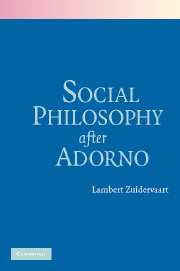Book contents
- Frontmatter
- Contents
- Preface
- Abbreviations
- Introduction: Thinking Otherwise
- 1 Transgression or Transformation
- 2 Metaphysics after Auschwitz
- 3 Heidegger and Adorno in Reverse
- 4 Globalizing Dialectic of Enlightenment
- 5 Autonomy Reconfigured
- 6 Ethical Turns
- Appendix: Adorno's Social Philosophy
- Bibliography
- Index
5 - Autonomy Reconfigured
Published online by Cambridge University Press: 18 December 2009
- Frontmatter
- Contents
- Preface
- Abbreviations
- Introduction: Thinking Otherwise
- 1 Transgression or Transformation
- 2 Metaphysics after Auschwitz
- 3 Heidegger and Adorno in Reverse
- 4 Globalizing Dialectic of Enlightenment
- 5 Autonomy Reconfigured
- 6 Ethical Turns
- Appendix: Adorno's Social Philosophy
- Bibliography
- Index
Summary
This is not a time for political works of art; rather, politics has migrated into the autonomous work of art, and it has penetrated most deeply into works that present themselves as politically dead.
Adorno, Notes to LiteratureAdorno's critique of the culture industry is both highly relevant and historically dated, both theoretically provocative and politically problematic. Developed in the 1930s and 1940s before the rise of new social movements, Adorno's critique identifies crucial issues that contemporary feminism needs to address. Although his critique turns on an idea of artistic autonomy to which many feminists object, their objections make social-theoretical assumptions that Adorno's critique can challenge.
Continuing my efforts at a critical retrieval, this chapter explores the relevance of Adorno's critique for contemporary feminism. After identifying a tension within feminism concerning the idea of artistic autonomy, I examine the role this idea plays in Adorno's critique of the culture industry. I then conclude by proposing a reconfigured notion of artistic autonomy, one that aims to overcome the limitations of Adorno's critique and to support a revitalized feminist politics.
FEMINIST CULTURAL POLITICS
The idea of artistic autonomy emerged from the eighteenth-century Enlightenment in Europe. It posits that the arts, and the sorts of experience that the arts afford, are properly independent from other types of human endeavor and need to follow their own rules.
- Type
- Chapter
- Information
- Social Philosophy after Adorno , pp. 132 - 154Publisher: Cambridge University PressPrint publication year: 2007



